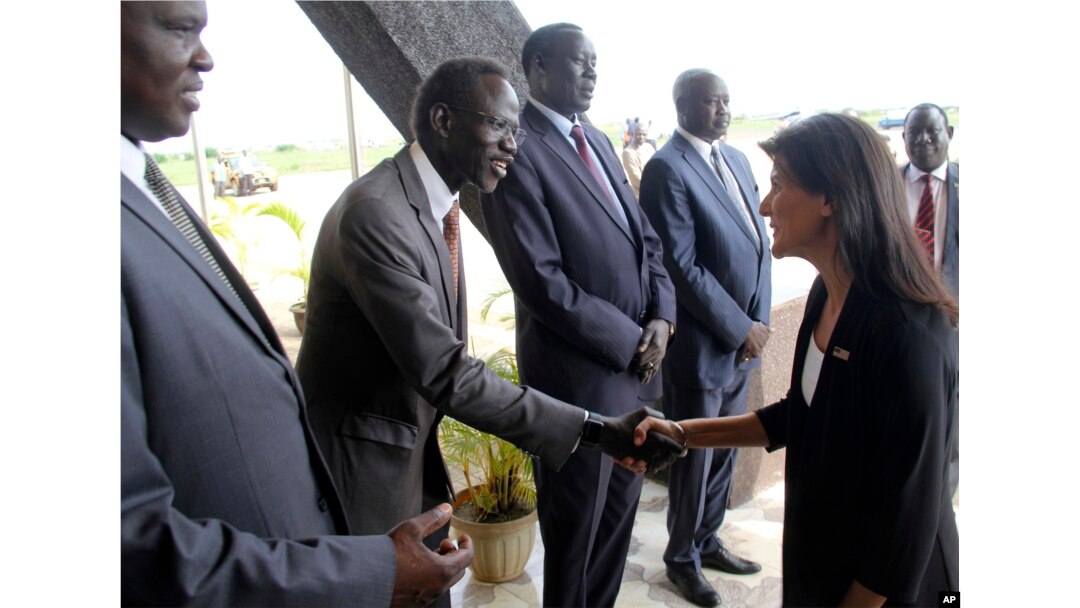A U.N. Security Council resolution to extend sanctions on South Sudan has been renewed for 45 more days after the U.S.-led effort passed at the U.N. Thursday.
The resolution passed with the required nine "yes" votes and six abstentions from the 15-member Security Council.
“The United States has lost its patience. And status quo is unacceptable. It is long past time for all of us to demand better for the South Sudanese people," U.S. Ambassador to the United Nations Nikki Haley said.
The Security Council delayed a decision for 30 days on imposing travel bans and asset freezes on six South Sudanese leaders accused of impeding peace, but said that move is still on the table pending a review of the parties’ commitment to adhere to a ceasefire violation.

FILE - US Ambassador to the United Nations Nikki Haley, right, meets South Sudanese officials on her arrival in Juba, South Sudan, Oct. 25, 2017. The ambassador, on a three-country Africa visit, met earlier with President Salva Kiir over the country's long civil war.
Akshaya Kumar, the deputy U.N. director for Human Rights Watch, said the delay could be interpreted as an empty threat, but she contends it serves as "a warning to commanders responsible for abuses,” such as former army Chief Paul Malong and Michael Makuei, the country’s information minister. Both are under U.N. sanctions consideration.
Sanctions 'unfortunate'
South Sudan’s representative, Ambassador Akuei Bona Malwal, said his government will work toward peace. He added that the proposal to impose an additional sanctions on six individuals was not necessary.
“The annex that is attached to this resolution is unfortunate, it is not helpful. The danger is that it may not give the desire that is hoped by those that have supported this resolution,” he said.
“A divided council on this issue will not be helpful to the peace process and it will not send the right message to the parties,” said Ambassador Tekeda Alemu of Ethiopia, who abstained from voting along with Russia and China.
Alemu urged council members to drop the threat of additional sanctions to allow the Intergovernmental Authority on Development to move forward with its efforts to revitalize the peace agreement.
Kumar said the 30-day delay concerning the six leaders "keeps the Security Council well-positioned to move decisively and keep adding individuals to their list if they find reason.” It also suggests the council is “watching and they are ready and willing to consider further action in early July,” Kumar said.
Ceasefire report
The Ceasefire and Transitional Security Arrangements Monitoring Mechanism (CTSAMM) is expected to brief the council on violations of the cessation of hostilities in the coming weeks. That could help “circumvent some of the problems we have had to date with the CTSAMM and the ceasefire monitoring, where information was being collected but it wasn’t going to decision makers publicly or in a timely fashion,” Kumar said.
A Reuters report this week accused CTSAMM of failing to release at least 14 ceasefire violation reports that document South Sudan’s army targeted civilians and “burned children alive and gang-raped women.” It also accuses the rebels of using child soldiers.
Kumar said that by reviewing CTSAMM’s reports, the Security Council has set the stage for more transparency in collecting evidence “and they are going to be reporting back within one month. So that’s quite strong. It shows that the eyes of the world are on South Sudan right now.”


